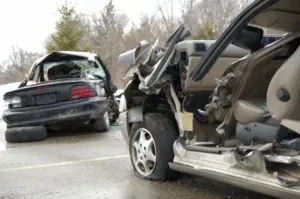Bus Accident Attorney
Need a Bus Accident Attorney that will work tirelessly to secure the highest possible settlement for your case?
Buses are a staple of any location, especially in a big city. People rely on buses to get around for all sorts of reasons. After all, a bus pass is cheaper than a car’s gas, loan payments, and maintenance. But taking the bus is not without risk, and sometimes accidents do happen.
Bus accidents come under personal injury law. If you’ve been injured in a bus accident, you may be entitled to compensation. Let’s take a closer look at bus accidents, including how a personal injury attorney can meaningfully help you in a lawsuit or claim based on someone’s negligence.
Call My Rights Law’s Bus Accident Lawyer Today
If you are injured in a bus accident, then it is essential that you consult with an attorney who is well-versed in bringing personal injury lawsuits. At My Rights Law, our motor vehicle accident lawyers are dedicated to helping victims get compensation for injuries that they sustain from bad bus drivers and their employers. We will aggressively fight on your behalf to get you every dollar that you deserve as a result of being injured. Don’t sleep on your rights. Reach out to My Rights Law today by calling (888) 702-8845 or leave a message on our contact form for a free consultation with one of our knowledgeable injury attorneys.
Bus Accident Basics
A bus accident is any accident in which a bus is somehow involved. Buses include school buses, city transit buses, tour buses, other public transport buses, and private buses. Common causes of bus accidents include:
- Negligence of the bus driver: One of the most prevalent causes of bus accidents is human error. The bus driver may have been driving under the influence or texting while driving. Alternatively, the owner of the bus may have been negligent in not making sure their employee – the bus driver – was a competent choice for the position.
- Inexperience: The bus driver may lack the experience they need to drive the bus safely.
- Mechanical failure: If the bus itself has some kind of mechanical issue, this can cause an accident. It is vital for bus operators to do routine maintenance check-ups.
- Bad weather: A bad storm or icy roads can often be the cause of bus accidents, although human error in operating the bus during such conditions may still have played a part.
- Other driver: Sometimes the bus operator is not at fault, as when the driver of another vehicle causes the accident.
If you are ever in a bus accident, call 911 first. The important thing is to get medical personnel there as soon as possible. Second, make sure to give your statement to the police. Finally, record the incident – including taking photos and/or video of the scene and writing down everything you remember – and gather as much information about the people and vehicles as you can. This will be vital if you decide to pursue legal action.
Negligence
In most states, you must prove that someone (likely the bus operator) was negligent in order to recover damages. To do so, you must show the following:
- Duty: You must prove that the bus driver or operator had a duty of care to you. Because a bus transports people from one place to another for a fee, it is considered a common carrier. A carrier must take the utmost care and diligence to safely transport persons.
- Breach: You must prove that the other person breached (violated) this duty of care.
- Causation: You must prove that the breach in the duty directly caused your harm.
- Damages: This refers to the injuries, property damage, and other losses that you suffered as a result of the incident. Providing evidence of these losses is crucial to alleviate your financial burden and to try to put you back in a position similar to the one you were in before the accident.
Who Is Responsible?
Every accident is different, so determining who should be held responsible can be difficult. If a car hit the bus, you would sue the driver of that car, and most likely, the claim would go through their insurance. However, you might have been injured on a bus due to the negligence of the bus driver. In that case, you first must look to see who owns the bus.
If the bus is owned by a private company, it probably has some type of liability insurance. While you could sue the driver as an individual, the driver most likely won’t be able to compensate you for your damages. However, the bus company was responsible for hiring the bus driver and will likely have more resources.
Alternatively, the bus could be owned by the government. For example, a city bus or school bus would be owned by the city or other municipality. There are different rules for government lawsuits, so if you were hurt on a public bus, you’d want to know the rules to avoid your claim being thrown out.
Under some states’ laws, you must file a notice of a suit against the government within six months of the accident. The corresponding government agency then accepts or rejects the claim. If it rejects the claim, you can still file a lawsuit. In some states, you can sue for the following:
- Negligence by employees
- Negligence by independent contractors
- Liability for something dangerous on government property
- Damages from the government’s failure to carry out a duty imposed on them by law
Filing A Claim Because Of Your Injuries
Every claim has a statute of limitations, which refers to the time period in which you can sue. Once this time period expires, you can no longer bring your personal injury claim to court. Personal injury claims generally have to be brought within just a few years from the occurrence of the incident. If you do not bring a claim within that time, you will most likely not be able to receive compensation in court. If your claim is against the government instead of a private company, the rules may be different.
What Compensation Can I Get For Filing A Claim?
Compensation from a bus accident can vary depending on how bad the accident was. Common injuries include:
- Broken bones
- Torn ligaments and/or tendons
- Bone fractures
- Burns
- Lacerations
- Concussions
- Cuts and bruises
- Spinal cord injuries
- Internal bleeding
- Sprained muscles
The goal of personal injury suits is to make the injured person as whole as can be. Your injuries won’t vanish, but you can receive compensation for them. The following list includes examples of expenses you can be compensated for.
- Medical treatments: This includes hospital admissions, surgeries, doctor visits, blood tests, exams, and radiology tests, as well as therapies both physical and psychological.
- Lost wages: This category includes any wages lost. If you were injured, you might have had to take at least a day or two off work. If it was a severe accident, you might have had to take months off work. The income you were not able to earn during that time is called lost wages and is recoverable.
- Loss of future earnings: This refers to any wages in the future that you were likely to receive had it not been for your injuries. For instance, your injuries may have prevented you from going back to your job permanently, and you had to find a job in a different field or stop working altogether. Or maybe you still have your original job, but your injuries prevent you from working full-time or ever getting a promotion. These are also recoverable.
- Pain and suffering: Pain and suffering damages include both the physical pain and emotional distress you incurred because of your injury.
- Loss of consortium: This refers to the loss of affection between spouses or partners as well as your individual contribution to the relationship, both economic and social.
Family members who can initiate a wrongful death claim include:
- Spouse
- Domestic partner
- Children
- Grandchildren
- Anyone who is entitled to receive the deceased person’s property
Family members who bring wrongful death claims can recoup the following damages:
- Funeral and burial costs
- Loss of deceased’s income and future earnings
- Loss of companionship
Comparative Negligence
Most states apply comparative negligence principles. This means that any damages awarded will be reduced by the percentage of fault that can be attributed to you. For example, suppose a bus operator was so drunk that he swerved and hit a pole, and a passenger who was acting unruly at the time was injured. The court might determine that the bus operator’s DUI contributed to the passenger’s injuries by 90 percent, while the passenger contributed to their injuries by the remaining 10 percent. In that case, the passenger can only recover 90 percent of their calculated damages.
What Can I Do If Injured In A Bus Accident?
After getting medical treatment, a victim can protect the value of their potential bus accident lawsuit by getting a free consultation with bus accident attorneys. Critically, a case evaluation with a well-informed accident lawyer allows you to properly gauge whether bringing a lawsuit makes sense and how to go about doing it. My Rights Law is a highly respected personal injury law firm that is focused on helping bus accident victims get compensation and justice. Know that our law firm is ready to help you when you need us. Reach out to My Rights Law today by calling (888) 702-8845 or by contacting us by filling out our secure web form for a free consultation with one of our knowledgeable personal injury attorneys.




















